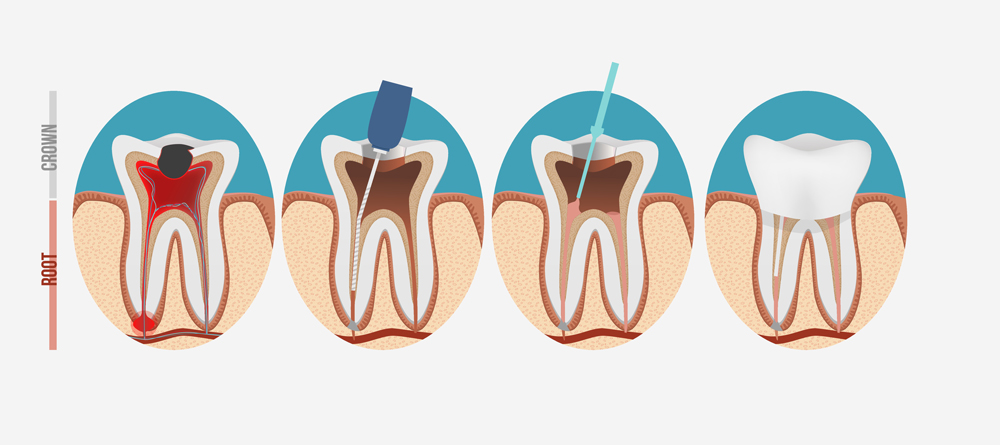What Is A Root Canal?
Sometimes a little extra care is needed to rid the tooth of a blossoming infection and save the tooth itself. One of the treatments that are often recommended in a situation like this is the root canal. While many associate this dental treatment with cringes and avoidance, learning about why it can be necessary and how root canals are performed can ease any anxiety so that the health of your teeth is restored.
Read below to learn what is a root canal and the procedure that can save a tooth.
What is a Root Canal?
A root canal is a type of dental procedure where tooth pain is relieved by removing the inflamed pulp from the infected or abscessed tooth. The treatment is performed by a type of dentist called an Endodontist, which is a root canal specialist with an additional two years of education and training that focuses on the inner parts of the tooth and treatment of the pulp in teeth. They work in conjunction with your dentist to restore your natural teeth and improve oral health.
When Would a Root Canal Be Recommended?
A root canal procedure is usually recommended when bacteria invade the pulp in your teeth, which often occurs when a cavity is untreated for an extended amount of time or a tooth has become damaged due to an injury to it. There are several symptoms that can indicate your dentist may recommend you for an endodontic treatment, like a root canal:
- Pain in a tooth or your teeth that don’t go away
- Discomfort radiating to your jaw, face, or other teeth
- Swollen gums
- Swollen jaw
- Tooth discoloration from poor blood supply to it
- Pain from pressure applied to a tooth, like when eating
- A loose tooth caused by infected pulp
- Pimple or boil on the gums resulting from the pus that is draining from an infected tooth.
- Unpleasant taste or smell
- Sensitivity to heat and cold in your teeth
If you have a combination of these symptoms then a root canal treatment will likely be recommended to save your tooth. Of course, you would need to be examined by your dentist to ensure that root canal therapy is the solution for what is causing these dental health issues.
What is the Root Canal Procedure?
A root canal procedure can take between 30 to 60 minutes and can require two dental office visits, though the treatment can reach an hour and a half if the root canal is being performed on a larger tooth with several roots. No matter the time it takes, a root canal treatment follows these steps:
- Prior to the treatment, your dentist will take dental x-rays to assess the extent of the damage and ensure a root canal is a right solution.
- Anesthesia is given to numb the infected tooth and surrounding gums.
- A dental dam is placed to isolate the tooth and keep it dry during the root canal treatment
- An opening is made in the crown of the tooth so the dentist can reach the pulp inside
- The pulp is removed along with the nerves, blood vessels, and tissues inside the tooth
- The pulp chamber inside the tooth and root canals is cleaned, disinfected, and shaped for new filling
- The canals are filled with gutta-percha, a flexible and rubbery dental material.
- A temporary dental filling is placed to seal the tooth and prevent bacteria from re-entering it.
- A dental crown will likely be needed to protect the tooth and restore your natural bite. To learn more about crowns, we recommend reading here: How Does a Dental Crown Work?
After the root canal is finished you’ll likely experience heightened sensitivity for a few days before they subside after two weeks. Many patients also report immediate relief from the tooth pain they suffered prior to the treatment.
Make a Root Canal Appointment Here!
If a root canal seems like the appropriate solution for you or has been recommended, we encourage you to schedule a consultation with Dr. Li. She’ll examine your health history and current dental health before outlining a treatment plan that is personalized to your teeth’ needs.
Dr. Li and the care team at Ellerslie 66 Dental Clinic strive to make dental care affordable and accessible to all of our patients. We will work with you to find a treatment plan for your dental bridge that works for your financial situation.
If you have questions about root canals, our team of compassionate professionals can help you understand all of your options. Contact us now or give us a call at (780) 705-9866.

